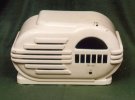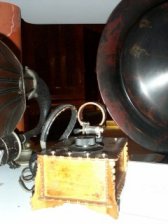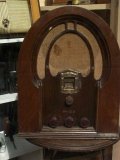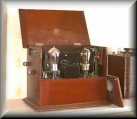FIRST QUESTIONS - 'HOW DO I'? - Q. (question) and A. (Answer)
| Q: Where do I start? |
| A: SOME OPENING STATEMENTS |
| Then follow through the links at the end of each page. |
| Q: Can I get a job as a Radio Drama Director? Actor? |
| A: Radio Drama is the key to many media and creative jobs. |
| The answer also lies in self-professionalisation and networking. |

| Q: How do I start on a radio drama production? |
| A: You can start on the business side, as a Producer, with AUDITIONS |
| Q: What script do I choose? |
| A: What resources do you have? Start with something which is a limited number of minutes in broadcast length. It is better to do something that is well acted and post-produced as best as you can, rather than lose listeners. |
| What follows is my personal advice and apologies if it does not suit your needs. My advice is NOT to adapt a stage play for radio. The scenes will be too long and your choice of play could expose your actors too harshly. For example, it takes a lot of skill to act Shakespeare or modern classics on radio - best leave that to the professionals. Also, very few radio play scripts are in print, and again, I doubt if any of these are suitable. |
| Have due regard for copyright - and adapt a short story, especially if it is fantasy, sci-fi, non-realist, and you use a narrator. See ADAPTATIONS. |
| A small number of good actors is better than a larger cast with too much of an ability range. |

Crystal set 1920s
| Do I need a radio drama studio? |
| Marvellous if you can work in one. YOU DO NOT NEED A STUDIO. You can work in the 'real' locations - meaning, those locations which 'read' as the sound locations for the scenes.They do not need to look like the scenes on the page of the script at all. |
| Working OUTSIDE THE STUDIO is called ON LOCATION or OB ('outside broadcast'). You need to ensure that your recorded takes are good enough quality audio. |
| So the dangers are: wind (and you cannot 'repair' this damage in POSTPRODUCTION), airplanes overhead, traffic, passersby, odd shouting. It all just takes more time for you and your actors, and the technical team. You are less in control. Your actors have to be more focused on the job. But - go ahead! |
| Working OB: The benefits are: Actors can be more energised. You can get much more movement and perspective. Actors can run up to the microphone, and move distances away from the microphone. You get a lively sound. |
| You need to do more in POSTPRODUCTION. |
| You cover problems with ATMOS BED (underneath the scene dialogue) - establishes scene location or scenery |
| underscoring music. |
| I use a SONY MZ-NH700 - Sony Portable Minidisc (COST ABOUT £140). Beware - most minidisk machines on sale now have NO microphone input. Be very careful about this and make sure you buy a minidisc machine WITH a microphone input. Equipment changes every couple of years. DAT machines are coming down in price. |
Go back to WELCOME PAGE or on to SOME OPENING STATEMENTS - sound pictures and directing
|
|



